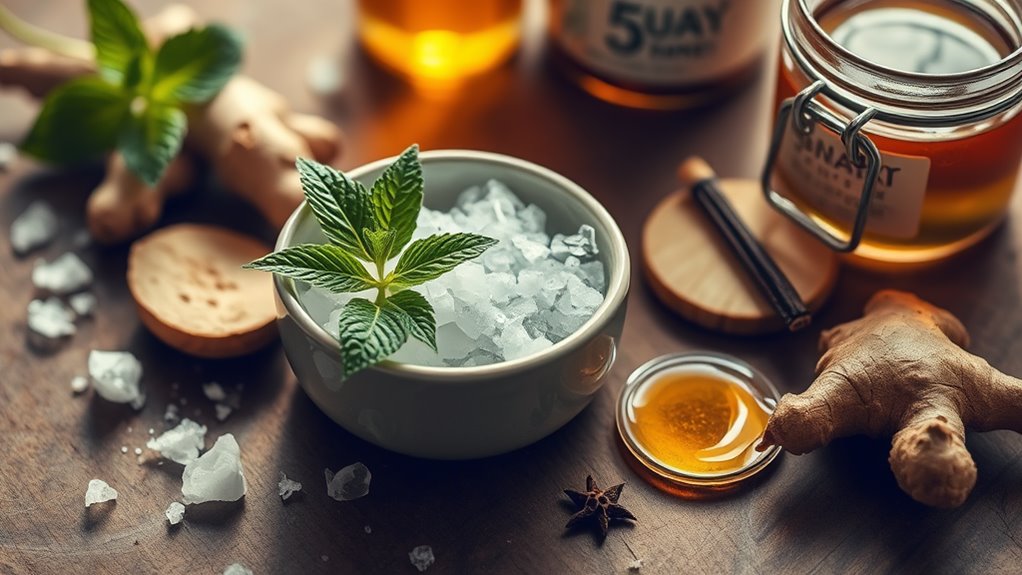The Role of Diet in Bad Breath
Your diet significantly influences your breath. Certain foods can promote the growth of bacteria that cause bad odors, while others can help freshen your mouth. For example, sugary snacks and acidic items often lead to plaque buildup, worsening the problem. Conversely, staying hydrated and choosing the right fruits and herbs can help combat these effects. Understanding these connections can provide you with effective strategies to maintain fresh breath. What might surprise you are the specific foods that can help or hinder your efforts.
Key Takeaways
- Sugary and acidic foods promote bacterial growth and can lead to bad breath by drying out the mouth and eroding enamel.
- Strong-smelling foods like garlic and onions contain sulfur compounds that linger and contribute to persistent odor.
- Dairy products and red meat can create an environment for bacteria to thrive, worsening breath odor.
- Staying hydrated is essential, as water helps wash away food particles and bacteria that cause bad breath.
- Incorporating fresh herbs like parsley and mint can naturally deodorize the mouth and reduce odor-causing bacteria.
Understanding Bad Breath: A Brief Overview
Bad breath, or halitosis, is a common condition that affects many people at some point in their lives.
One significant contributor to halitosis is your diet.
Foods high in sugar and refined carbohydrates can promote bacterial growth in the mouth, leading to unpleasant odors.
Additionally, certain proteins break down into sulfur compounds, which can worsen bad breath.
Staying hydrated is crucial, as a dry mouth can exacerbate the issue.
Incorporating fresh fruits and vegetables in your diet can combat halitosis by stimulating saliva production and providing natural cleansing properties. Being proactive in oral care ultimately, your dietary choices play a vital role in maintaining fresh breath.
Foods That Cause Bad Breath
Certain foods can significantly contribute to bad breath, often by promoting the growth of odor-causing bacteria in the mouth.
Garlic and onions are notorious for their strong sulfur compounds, which linger long after consumption.
Dairy products, particularly cheese, can create a breeding ground for bacteria due to their high protein content.
Additionally, red meat breaks down slowly, releasing unpleasant odors.
Spices like curry and certain fish are also culprits, as they contain potent oils that can affect your breath.
Maintaining good oral hygiene is essential in preventing the unpleasant odors caused by these foods.
The Impact of Sugary and Acidic Foods
While enjoying sugary and acidic foods can be tempting, they can have a detrimental effect on your breath.
These types of foods create an environment in your mouth that promotes bacterial growth, leading to foul odors.
Here are some key points to consider:
- Sugary foods feed harmful bacteria, resulting in more plaque and odor.
- Acidic foods can erode enamel, increasing the risk of cavities and bad breath.
- Both types can dry out your mouth, reducing saliva, which is essential for neutralizing odors.
Additionally, poor oral hygiene exacerbates the negative effects of these beverages and foods, making it crucial to maintain a consistent dental care routine.
Being mindful of your dietary choices can significantly improve your oral health and freshen your breath.
Hydration and Its Effect on Oral Health
Staying properly hydrated is essential for maintaining fresh breath and overall oral health. Water not only helps enhance saliva production, which is crucial for washing away food particles and bacteria, but it also supports a healthy balance of oral bacteria. Additionally, chronic dry mouth can lead to an increase in bad breath, making it important to address any underlying medical conditions that may be contributing to this issue.
Water’s Impact on Breath
How does hydration affect your breath?
Staying hydrated is crucial for maintaining fresh breath.
When you’re dehydrated, your body produces less saliva, which can lead to an increase in bacteria that cause bad breath.
Drinking enough water helps wash away food particles and bacteria, promoting a healthier oral environment.
- Prevents Dry Mouth: Adequate hydration combats dry mouth, a common contributor to bad breath.
- Flushes Bacteria: Water helps rinse away bacteria and food debris that can lead to odor.
- Promotes Overall Oral Health: Proper hydration supports a balanced oral ecosystem, reducing the risk of dental issues that can cause bad breath.
Saliva Production Enhancement
Hydration plays a significant role in enhancing saliva production, which is vital for maintaining oral health and fresh breath.
When you’re properly hydrated, your body produces adequate saliva, helping to wash away food particles and neutralize harmful acids.
This natural process not only combats bad breath but also supports the health of your teeth and gums.
Drinking water regularly throughout the day can stimulate saliva flow, particularly if you’re consuming dry foods.
Remember, a well-hydrated body not only promotes fresh breath but also aids digestion and overall wellbeing.
Hydration and Bacteria Balance
Maintaining a proper balance of bacteria in your mouth is essential for optimal oral health, and hydration plays a crucial role in this process.
Drinking enough water helps to wash away food particles and bacteria, reducing the risk of bad breath. When dehydrated, your body produces less saliva, allowing harmful bacteria to thrive.
- Water aids in saliva production, which neutralizes acids.
- Adequate hydration prevents dry mouth, a key contributor to bad breath.
- Staying hydrated supports overall health, including gum and tooth health.
Ensure you drink enough water daily to promote a healthy balance of oral bacteria and fresh breath.
Herbs and Spices That Freshen Breath
Herbs and spices can play a significant role in freshening your breath naturally.
Ingredients like parsley, mint, and fennel not only add flavor to your meals but also help neutralize odor-causing compounds in your mouth. Incorporating these culinary herbs into your diet can enhance your oral health while providing a refreshing boost. Additionally, their ability to stimulate saliva production is crucial for maintaining mouth cleanliness and combating bad breath.
Natural Breath Fresheners
Natural breath fresheners can be a game changer when combating bad breath.
Incorporating certain herbs and spices into your diet can help neutralize odors and promote oral health.
Here are a few effective options:
- Parsley: Rich in chlorophyll, it acts as a natural deodorizer.
- Mint: Contains menthol, which provides a cooling effect and masks bad odors.
- Cinnamon: Its antimicrobial properties can help reduce bacteria in your mouth.
Culinary Herbs Benefits
Incorporating culinary herbs and spices into your meals not only enhances flavor but also offers impressive benefits for freshening breath.
Herbs like parsley, mint, and basil contain chlorophyll, which acts as a natural deodorizer. Additionally, spices such as cinnamon and cloves have antimicrobial properties that combat bacteria responsible for foul odors.
Chewing on fresh mint leaves or adding them to dishes can significantly reduce bad breath.
Furthermore, these herbs and spices stimulate saliva production, aiding in washing away food particles. By incorporating these flavorful options into your diet, you can enjoy a delicious meal while promoting fresh breath.
Probiotics and Their Role in Oral Hygiene
Probiotics play a crucial role in maintaining oral hygiene by promoting a balanced microbiome in your mouth.
They help reduce harmful bacteria that contribute to bad breath, tooth decay, and gum disease.
Incorporating probiotics into your diet can foster a healthier oral environment.
- Enhance saliva production, which aids in washing away food particles
- Reduce the growth of odor-causing bacteria
- Support overall immune function that protects oral tissues
Additionally, a healthy mouth supports a balanced gut microbiome, which is essential for overall digestive health.
Tips for Maintaining Fresh Breath Through Diet
How can your diet influence your breath?
Certain foods can contribute to bad breath, while others can help maintain freshness.
Incorporate crunchy fruits and vegetables like apples and carrots; they stimulate saliva production, which cleanses the mouth.
Stay hydrated—water helps wash away food particles and bacteria.
Avoid garlic and onions, as their sulfur compounds linger in your mouth.
Opt for yogurt with live cultures, which can reduce odor-causing bacteria.
Fresh herbs like parsley and mint can also combat bad breath.




